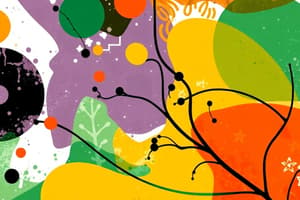Podcast
Questions and Answers
Which branch of science focuses on the study of human behavior in social and cultural aspects?
Which branch of science focuses on the study of human behavior in social and cultural aspects?
- Natural Sciences
- Formal Sciences
- Applied Sciences
- Social Sciences and Humanities (correct)
Natural sciences are sometimes referred to as 'hard science.'
Natural sciences are sometimes referred to as 'hard science.'
True (A)
What is the primary goal of basic science?
What is the primary goal of basic science?
Knowledge for knowledge's sake
The study of living organisms falls under the branch of __________ science.
The study of living organisms falls under the branch of __________ science.
Match the following branches of science with their descriptions:
Match the following branches of science with their descriptions:
Which of the following is NOT a sub-discipline of biology?
Which of the following is NOT a sub-discipline of biology?
What is biology primarily the study of?
What is biology primarily the study of?
Social sciences mainly utilize quantitative data for their investigations.
Social sciences mainly utilize quantitative data for their investigations.
What term is used to describe specialized scientific disciplines that possess their own terminologies and expertise?
What term is used to describe specialized scientific disciplines that possess their own terminologies and expertise?
Biology exclusively focuses on living organisms and does not relate to non-living things.
Biology exclusively focuses on living organisms and does not relate to non-living things.
What is a hypothesis?
What is a hypothesis?
The scientific method includes defined steps such as experiments and careful ______.
The scientific method includes defined steps such as experiments and careful ______.
Match the terms with their correct definitions:
Match the terms with their correct definitions:
What is required for a hypothesis to be considered a theory?
What is required for a hypothesis to be considered a theory?
The scientific method is equally applicable to all fields of study.
The scientific method is equally applicable to all fields of study.
What role does the scientific method play in biology?
What role does the scientific method play in biology?
Flashcards
Biology definition
Biology definition
Study of life and living organisms, their structures, processes, interactions, development, and evolution.
Biology scope
Biology scope
Broad, ranging from cells to ecosystems.
Science definition
Science definition
Knowledge of general truths and laws, often acquired and tested by the scientific method.
Scientific method
Scientific method
Signup and view all the flashcards
Hypothesis
Hypothesis
Signup and view all the flashcards
Theory
Theory
Signup and view all the flashcards
Science scope
Science scope
Signup and view all the flashcards
Unifying concepts in Biology
Unifying concepts in Biology
Signup and view all the flashcards
Formal Sciences
Formal Sciences
Signup and view all the flashcards
Natural Sciences
Natural Sciences
Signup and view all the flashcards
Social Sciences
Social Sciences
Signup and view all the flashcards
Basic Science
Basic Science
Signup and view all the flashcards
Applied Science
Applied Science
Signup and view all the flashcards
Physical Sciences
Physical Sciences
Signup and view all the flashcards
Life Sciences
Life Sciences
Signup and view all the flashcards
Scientific Knowledge
Scientific Knowledge
Signup and view all the flashcards
Study Notes
Introduction to Biology
- Biology is the study of life and living organisms, examining their structure, processes, interactions, mechanisms, development, and evolution.
- Biology's scope is vast, ranging from microscopic cells to entire ecosystems.
- Unifying concepts consolidate biology into a coherent field.
- Biology also studies non-living things, as living things interact with their environment.
Processing of Science
- Science is knowledge of general truths and laws, often acquired and tested through the scientific method.
- The scientific method involves experiments and observations, with a crucial step of hypothesis formulation, which can be tested repeatedly.
- A hypothesis is a suggested explanation for an event.
- A verified hypothesis becomes a theory, a tested explanation for observations or phenomena.
- Science aims to understand the universe's nature.
- The scientific method may also be used less readily in disciplines like archaeology, psychology, and geology.
Branches of Science
-
Sciences are grouped into:
- Formal sciences: Study formal systems (logic, math) using a priori methodology.
- Natural sciences: Study natural phenomena.
- Divided into physical and life sciences (biology).
- Social sciences and humanities: Study human behavior in its social and cultural aspects.
-
Key aspects of all sciences: knowledge must be based on observable phenomena and verifiable by other researchers.
-
Natural science, physical, social science (and related formal sciences) form the basis of interdisciplinary and applied sciences (engineering and medicine).
-
Specialized disciplines exist in multiple science categories but often have their own terms and expertise.
-
"Hard sciences" such as natural sciences rely on quantitative data.
-
Social sciences use qualitative assessments.
-
Biology has numerous branches, including:
- Cell biology (cell structure and function)
- Anatomy (organism structure)
- Physiology (organism function)
- Botany (plants)
- Zoology (animals)
- Biochemistry/Biophysics
Types of Science
- Basic (or pure) science aims to expand knowledge without immediate applications, focusing on knowledge for its own sake.
- Applied science aims to solve problems and develop products and services.
Studying That Suits You
Use AI to generate personalized quizzes and flashcards to suit your learning preferences.




